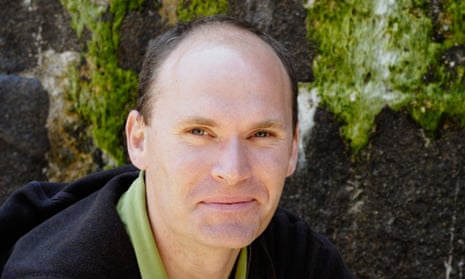It was Anthony Doerr’s wife Shauna who saw the news first. She was the one who was secretly streaming the Pulitzer ceremonies on YouTube in another room of their Paris apartment. He was in the kitchen with their son Owen, eating mint chocolate chip ice cream. She came in shaking and the phone started ringing, because he’d just won the Big Kahuna of American literary prizes: the Pulitzer for fiction.
“I’d sort of known it was the day,” Doerr said on the phone to the Guardian on Tuesday. But he was trying not to think about it, or expect the win. He had enough to be grateful for: even before the prize was announced he was already enjoying the greatest success of his career with All the Light We Cannot See.
The book has spent most of the last year on the New York Times bestseller list, and Doerr tells me now his readings are stuffed with a much wider variety of people than he used to draw. Doerr is the kind of writer who when asked about his influences readily cites Anne Carson and Cormac McCarthy. “Sometimes my readers ask me what else they should read,” he told me, “and I recommend Sebald.” But he’s never sure if the sort of reader this new book has attracted will enjoy Sebald as much as he does.
All the Light We Cannot See follows two children whose fates are entwined by the second world war. One, a French girl named Marie-Laure, is blind. The other, a German boy named Werner, is a whiz with radios. Without giving much away, these complementary qualities lead them on a clear path towards each other. The novel has been praised in, among other publications, the Guardian as a “page-turner”.
But Doerr’s book is not like your average great American novel, in part because it is a very lyrical piece of work. It is not sprawling or maximalist; its pleasures come from how carefully and artfully Doerr commands plot and language. Doerr’s sentences are short and spare; the chapters brief too. This gives the impression of simplicity, and indeed the book was sometimes criticized for it. In a review in the New York Times, for example, the novelist William T Vollmann called the book “more than a thriller and less than great literature”. Vollmann found the book full of “flimsy types”, particularly when it came to the Nazis.
The thing about lyrical prose and tight plots is that they have a habit of hiding the work they took to produce. It took Doerr 10 years to write All the Light We Cannot See, and in between, he told me, he “procrastinated” by writing two other books. (One was a collection of short stories, the other a memoir of fatherhood.) The problem that kept leading him away from the book, he said, was the research.
But it is research which allowed him to include details about the radios used in Nazi Germany: “Even the poorest pit houses usually possess a state-sponsored Volksempfänger VE301, a mass-produced radio stamped with an eagle and a swastika, incapable of shortwave, marked only for German frequencies.” And it is the accretion of such details that makes the novel seem so intricate, beautiful and, on some level, magical.
Doerr acquired an interest in this kind of magic early on. He grew up outside Cleveland, “where to call yourself a writer would be precocious. Or pretentious.” He became interested in books in the ordinary way: his mother read to him. He remembers, particularly, the Chronicles of Narnia. Even as a small child he asked her: “How did they do that?” His mother had to inform him that actually, just one person had written the story. And that’s when he learned that was a thing people could do.
After a few years bumming around Telluride, Colorado, Doerr’s first success was a short story he placed in the Atlantic in 2001. “I was paid maybe $3,000 for it,” he said, “and the hourly wage on it was very small”. But it generated a huge response, and led him to sell his first book of stories to Scribner. The short stories won him acclaim, but this is his first experience of mainstream popularity.
I ask Doerr if he knows what drew people to All the Light We Cannot See in particular. It can be dangerous to ask a writer to speculate about his own writing’s appeal but he’s game, and offers me a few theories. One has to do with the weight of the themes that the second world war raises, which he admits does draw a lot of interest. Another has more to do with his use of fable. At the beginning of the book, Marie-Laure is enraptured by a tale of a stone called the Sea of Flames. “It’s a way of letting readers into the story,” he says, of those elements. We talk about the way writers like Karen Russell and Kelly Link have used magical elements in their work. He talks about admiring Link, who he says, unlike himself, is confident, convinced that the inclusion of such elements “doesn’t make her writing any less serious”.
But Doerr also offers one, slightly more practical explanation for the appeal of his style. When he was writing All the Light We Cannot See, he said, he was busy with new fatherhood, not sleeping a lot. He found writing sparingly, with a lot of “white space”, to suit the new-parent lifestyle. “Maybe,” he said, “for readers, that helps too.”

Comments (…)
Sign in or create your Guardian account to join the discussion